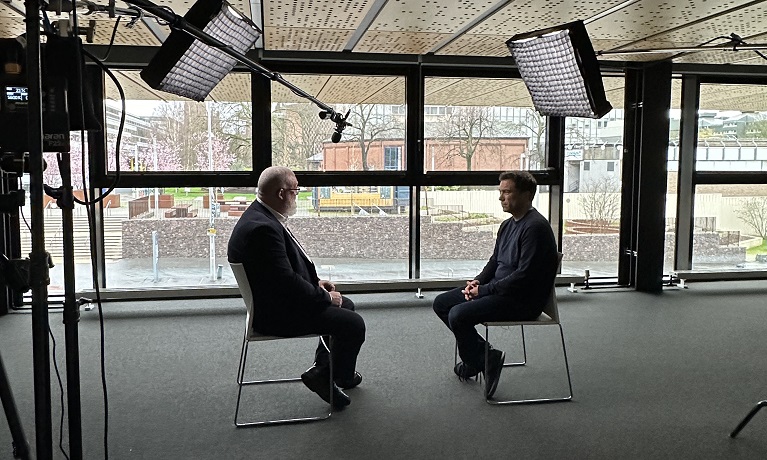Search
Opinion: BBC Panorama, Coventry University and the real value of international students

Coventry University Provost Ian Dunn being interviewed by BBC Panorama
Monday 25 March 2024
Press contact
Our provost Ian Dunn features in the latest BBC Panorama programme on the record rise in net migration. Here he gives his thoughts on international students and their impact on the UK.
Tonight’s Panorama programme on BBC One, for which I and some of our students were interviewed, came to the conclusion that legal migration is at the level it is due to government policy.
It showed that almost 42% of visas issued last year went to overseas students and their dependants, with the care sector and skilled workers the other two big contributors.
The real issue is not the numbers themselves but what level of migration is needed and indeed beneficial to the UK and what the alternatives are for the sectors in focus and our economy as a whole. If you watch Panorama you get a clear sense the alternatives are not palatable, cheap or even viable right now.
If you walk through our Coventry city centre campus, you cannot fail to notice how diverse our student population is, but you may be surprised to learn it is home to people from 162 nations. We are immensely proud of this and the positive impact on our community, UK plc and the communities that our students are from and return home to – after they have delivered more than £40 billion in education export income into this country.
Diversity is one of our core values because it is vital to harness the immense power of different voices, backgrounds and perspectives, especially in an educational setting where debate and challenge are key to the innovation that helps drive the UK economy.
There are a few things wrong with the current narrative on international students. Firstly, we are very good at counting them in due to heavy regulation, visa controls and stringent university systems. But no one counts them out again, so it is easy to assume they are staying here.
We know most go home to help improve their communities but some wish to stay on and apply for the two-year post-study work visas. This is a good thing. We have attracted the brightest and best to the UK, they have improved their skills learning with us, so keeping them a bit longer to use those skills in our industries should seem like an excellent idea to a country that needs to compete on a global stage and no longer has access to the 400 million plus population of the European Union.
Secondly, despite what you may read, international students are not taking the places of UK students – they are subsidising the places of UK students, and so much more too. The UK tuition fee has been frozen for a decade and rampant inflation has eroded its real value to around £6,000.
Many universities will tell you they lose money teaching their UK students, but we will not stop teaching them and we are not expecting pity or for fees to increase, even though some universities are in real financial trouble as they don’t have the balance sheet we have at Coventry. Capacity is not an issue given at Coventry alone we would have had 4,000 EU students on campus today, were it not for Brexit.
Lastly, international students and their dependants (now mostly banned) are not a burden on the UK. International students must pay an NHS surcharge, most live in purpose-built student accommodation and their net impact is overwhelmingly beneficial in the UK’s favour thanks to that £40bn a year in export income.
Not all of my Panorama interview made it to the final edit, naturally, but I was pressed repeatedly on two things – the impact and financial value of international students. I know their value and it is not just financial. This impact is hugely positive, not the negative some might assume or assert with little regard to the evidence. Universities are not just a place where you learn your chosen subject, you grow as a person and develop networks of friends and peers who can help support your career for a lifetime.
Our UK students can interact with people from 162 nations at our main Coventry campus and they may go on to discover that in a globally connected world a peer network that stretches to Singapore, South Korea, Nigeria and China is more valuable than one that ends at Stockport and Surrey. All will discover the power of diversity and experience different cultures, perspectives and values.
Ros Atkins pushed me on the link between international students and the financial health of the higher education sector. As stated, some of our peers have real problems but an honest national debate about how the UK finances higher education is a question for politicians and taxpayers.
All we can do is work within the environment we are given and that is what we have done in successfully recruiting international students that contribute billions to the UK economy. In the same programme, Suella Braverman suggested it wouldn’t be a bad thing if some universities went bust and closed.
Naturally, I am appalled at that suggestion because the impact would be felt wider than my colleagues in the sector, and I wonder where it may leave the levelling up agenda we have heard so much about.
Perhaps we are just collateral damage and will have to adjust and adapt, but in acting to choke off this source of income, diversity and strength, the UK communities and students’ which universities serve and support stand to lose far more than they could possibly gain.




